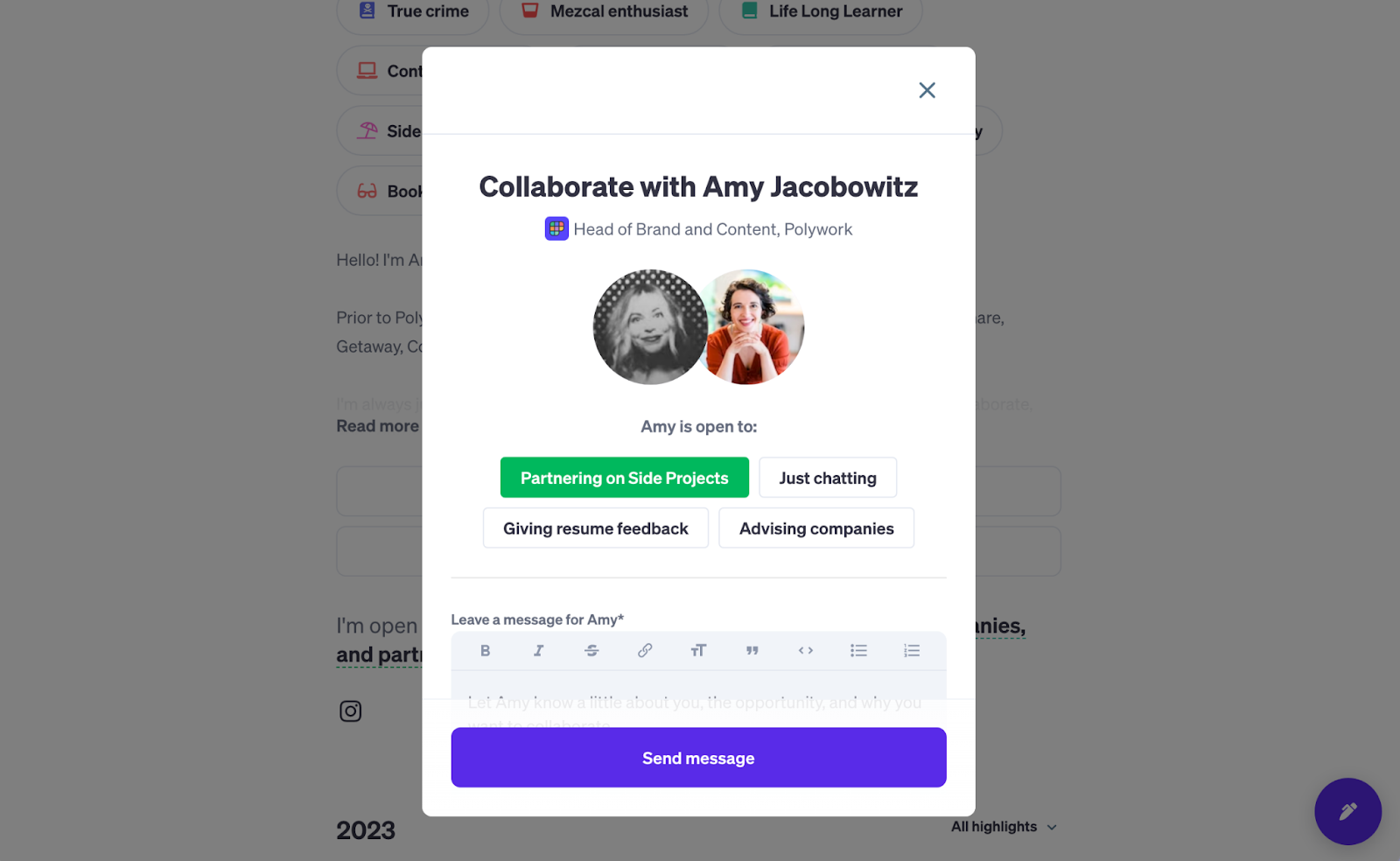If you’re like most multi-hyphenates, you’re probably constantly bursting with ideas for new side projects you want to dive into. But going from idea to execution can be challenging. Too many side project ideas sit lost in worn Moleskines, never to see the light of day. But in a time where only half of people are completely satisfied with their work, side projects present a rare opportunity to dive into something you’re truly excited about. You just have to, you know, actually dedicate time to it.
If you’re ready to change the narrative and finally get around to starting a side project you’ve had in mind, asking yourself these questions can help you intentionally plan and set you up for success (or at least set you up to stick with it).
1. Why do you want to start a side project?
Before you go any further on starting a side project—before, even, you pick the seed of an idea you want to run with—you’ll want to be clear on your why. Understanding what you’re hoping to get out of this project can guide you towards which idea to pursue, and help you frame how you want to balance this project with the other aspects of your life. For instance:
- Are you looking to explore a new interest or creatively challenge yourself? Maybe you approach your side project as more of a hobby, letting yourself be more flexible in how much time you give it, and enjoying the process rather than worrying too much about achieving a particular outcome.
- Are you aiming to develop a new skill that could advance your career? You may want to be a bit more intentional in choosing a project that will look impressive on a resume or portfolio, and set a timeline for getting it done in line with any professional goals.
- Are you hoping this will be a true side hustle that will make money or scale into a new venture? This type of side project will probably require the most time and dedication from you, and you’ll want to do some legwork ahead of time to ensure that you have a unique idea and there’s market demand for what you want to create.
There’s no wrong answer, just make sure you know your motivations first. This will also serve to keep you, well, motivated. A side project is going to add more work to your life, and is unlikely to always be fun. Understanding why you’re in it will help you push through when you’re stuck on a tough problem or putting in time on the weekends.

2. What resources will you need for this side project to succeed?
Once you’ve landed on an idea that feels in line with your goals, it’s time to start digging into the nitty gritty of what it’s actually going to take to both launch and sustain your side project—and whether you’re willing and able to invest in those things. This includes:
- Monetary investments: What stuff will you need for this side project? Whether it’s new hardware or tools, raw materials, or software subscriptions, create a list of everything your side project will require and, if you don’t already have those things, price out how much they’ll cost. Is that within your budget right now? If not, is there a cheaper side project you could tackle, or an initial version of this you can invest in now, and save to upgrade it later? (e.g., you could get your podcast off the ground with a cheaper mic, with the goal to upgrade your sound system in the future.)
- Time and energy investments: How much time will you need to devote to this side project each week? Will you be able to put in that time given your other commitments? It’s worth pulling out your calendar and considering when, exactly, side project time could fit in. Remember: Productivity isn’t just about time management, but also about energy management. Just because you have time after work, doesn’t mean you’ll have the energy to show up—schedule your side project work sessions with this in mind.
- Relationship or educational investments: If you don’t have all of the expertise to make your side project succeed, how will you get it? Do you have friends or collaborators you can tap for help? Are there classes you’ll want to take to upskill yourself?

3. How will you keep yourself accountable?
You’re not going to have a boss keeping you on track for your side project. If you’re already self-employed and have systems for keeping yourself accountable (or know you’re just naturally good at staying self-motivated), feel free to skip this question. Anyone else, take a moment to consider how you’ll keep yourself showing up for your side project even when you might feel tempted to do something more relaxing in your off hours. For instance, you could:
- Schedule work time (perhaps with other people): Simply scheduling side project time on your calendar may be enough to help you prioritize it. Need more incentive to show up? Schedule that work time with other friends who are working on side projects, or use a service like Cave Day to schedule facilitated work sessions.
- Make some public promises: Some side projects—like podcasts or newsletters—have built in accountability since you’ll have an audience expecting content on whatever schedule you’ve told them. If that’s not the case for your idea, can you create some public accountability somehow? For instance, maybe you make your software project open source, including a release schedule for new features, so you have some “customers” who are counting on you.
- Have a side project accountability buddy: Supportive family, friends, or colleagues may be enough to keep you going. Send regular updates on your progress to people in your network—particularly those who you admire—or ask them to check in on your progress from time to time.

4. How will you measure progress?
A big challenge with starting a side project can be losing steam if you don’t feel like you’re making progress—especially if you’re only putting in a few hours a week. So it’s good to walk in with an idea of how you can feel like you’re making gains, even if progress is slower-going. Here are some ideas:
- Break your big vision into micro goals: There’s lots of research to back up the idea that finishing even the smallest task towards your goal can give your brain a dopamine hit and push you to keep going. It may take quite some time to code an entire program, but working on individual features or bug fixes? Those are things you can achieve in short work sprints.
- Track time spent working instead of progress on tasks: Use the best practice of bullet journalers and start visually tracking increments of time worked each week instead of progress on tasks. For instance, author V.E. Schwab tracks 30-minute work sprints each day to feel like she’s making progress on her novels. At the end of each month, you can see you put in the time, even if it feels like your side project is still far from complete. Or, use the “Seinfeld Strategy” and keep a wall calendar or organizational app to check off every day you put some work into your side project. You’ll have a record of days you showed up (and, a motivation to keep working every day so you don’t break the chain).
- Schedule a regular retro: Check in with yourself every week or month and jot down exactly what you worked on since your last retro, along with any major milestones or achievements. Anytime you think you’re not making progress, you’ll have a record of just how far you’ve come.
5. Are you still excited about launching this side project?
After you’ve gone through all of this, gut check your enthusiasm. Passion and interest are what will ultimately drive a side project to success, so if that’s not there, you might want to consider exploring another idea or not pursuing a side project right now.
If you’re not sure, think if there’s a way to dip your toes in the water of this side project before going all in. Could you write a long article instead of committing to an entire book? Do one mock interview before telling everyone about your upcoming podcast? If nothing else, it will kickstart you.
If you are still jazzed to get going on this side project, congratulations! By answering these questions, you’ve created a plan for actually, finally starting it. Set your first micro goal or plan your first work session and get going! Don’t forget to share your side project updates on Polywork so we can all celebrate your progress and motivate you to keep going.


